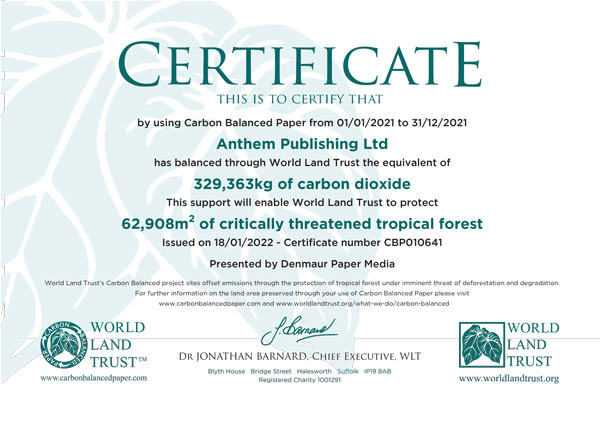Anthem’s swap to Carbon Balanced Paper saves 63,000m2 of threatened tropical forest
At the start of 2021, Anthem decided to make the switch to Carbon Balanced Paper in an effort to help protect the environment. And after 12 months, it’s clear that a small change can make a very big difference…
Alongside many companies across the UK, at Anthem we’re trying to reduce our impact on the environment.
As a publisher of magazines that have paper editions as well as digital ones, there’s no denying that we’re responsible for the cutting down of trees.
But we want to be able to do this in as environmentally friendly way as possible.
So at the end of 2020, when we discovered that there was a way of somewhat making up for that fact, we jumped at the opportunity.
Over the course of 2021, we swapped to using Carbon Balanced Paper to print our titles, resulting in us balancing the equivalent of 329,363kg of carbon dioxide through World Land Trust.
This has allowed World Land Trust to protect 62,908m2 of critically threatened tropical forest.
What is Carbon Balanced Paper?
The numbers sound like we’re really helping to make a difference, but what does it all mean?
What actually is carbon balancing?
Put simply, trees absorb carbon from the atmosphere. But every time you cut a tree down, the carbon that has been stored in that tree is released back into the atmosphere.
So in order to offset this, we buy Carbon Balanced Paper and money is given to World Land Trust to protect tropical forests that are under imminent threat of deforestation and degradation.
Roger Wilson, Senior Conservationist at World Land Trust explains it best…
“We take funding for the emissions a company is giving out, then go to a forest and protect that forest. We have prevented that from being chopped down and the CO2 being released.
“In areas where the forest has already been cut down, we can plant trees or encourage the growth of the forest to grow naturally, with a little help. The newly growing forest then accumulates carbon as it grows.
“People talk about tree planting as being the best thing you can do, but no, the best thing is to save the standing forest.”
How is carbon balancing calculated?
Roger Wilson goes on to explain how Carbon Balanced Paper works…
“The first step is to calculate the carbon footprint of producing a tonne of paper.
“The next step is to choose an area of forest and work out how much carbon there is in that forest, then look at the 10 year track record of how fast that area is being chopped down. If you can stop that from happening, that compensates for your emissions.”
It’s a small change for us to make at Anthem, but one that we think is vitally important, and we’re pleased to have been able to make such a difference in our first year.
We’ll keep doing everything we can to make positive changes wherever we can and support the fight for a better future for our planet.



